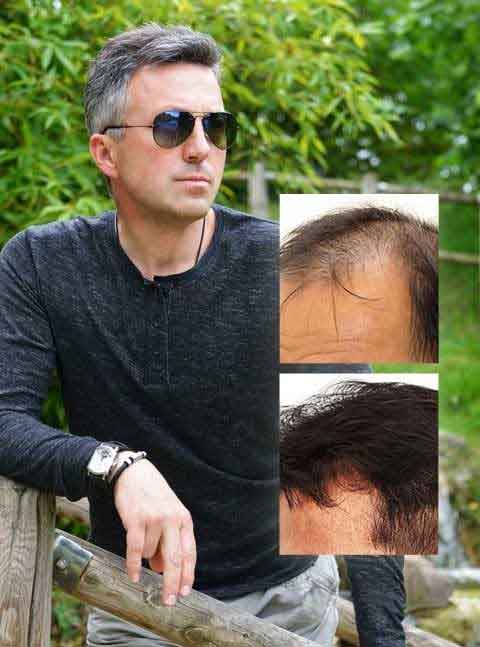Hair Transplant FAQ
Permanent, Natural Hair Restoration with Your Own Growing Hair
Hair Transplants: An Overview
Hair transplantation is a surgical procedure typically used to address hair loss issues. The procedure involves extracting hair follicles from a donor site, usually the back of the scalp, and implanting them into areas experiencing hair thinning or baldness. Hair transplants can be beneficial for conditions like male pattern baldness, female pattern baldness, and hair loss caused by trauma or certain inflammatory diseases.
Reasons to Opt for Hair Transplants
Hair loss can greatly impact an individual’s self-esteem and confidence. If you’ve been experiencing hair loss, a hair transplant procedure might be an appropriate solution for you. It can be particularly beneficial if you have severe hair loss, and other treatments have not been effective. The procedure can help restore your hairline and increase hair density, enhancing your overall appearance.
Before undergoing a hair transplant, you should have a thorough consultation with your doctor. They will evaluate your hair loss, discuss your goals and expectations, and explain the procedure in detail. They’ll also go over your medical history and current medications to ensure you’re a suitable candidate for the procedure.
Hair Transplant Costs
The cost of hair transplant procedures can vary significantly based on the extent of the treatment and the specific technique used. On average, you might expect to spend several thousand dollars on a hair transplant. It’s important to remember that while cost is certainly a factor, the expertise of the surgeon and the quality of the results should be your primary considerations.
Recovery Time and Expectations
After a hair transplant procedure, you can generally return to work almost immediately. The healing process varies from person to person, but typically, the scalp heals in about 2-4 weeks. Hair growth from the transplanted follicles often begins 3-4 months post-procedure following a normal initial shedding, with full results typically seen after nine to 12 months.
As with any surgical procedure, hair transplants carry some degree of risk. Potential complications might include infection, bleeding, scarring, or numbness. However, these risks are relatively low, and the vast majority of patients have a smooth recovery. It is important that you thoroughly discuss these risks with your doctor before the procedure, and rigorously follow his post-operative instructions and guidance closely.
FUT Hair Transplantation
Follicular Unit Transplantation (FUT) – the most common and widely accepted hair transplant procedure – is a minimally invasive surgical procedure that involves the extraction and transplantation of individual hair follicles from a donor area to areas affected by hair loss. This technique has come a long way since its inception in 1939, with significant advancements made in the 1990s that resulted in more natural-looking results with minimal scarring in the donor area.
FUT is particularly effective in addressing receding hairlines caused by male pattern baldness and is indicated in patients with a significant amount of balding. By carefully extracting a narrow strip of skin from the back or side of the scalp, a skilled hair transplant surgeon can obtain a sufficient number of hair follicles for transplantation. These follicles are then meticulously transplanted into the balding areas, paying careful attention to hair growth patterns and other factors, resulting in a fuller head of hair with a natural, pleasing front hairline.
Ideal Candidates for Hair Transplantation
Surgical hair restoration is an excellent option for individuals experiencing hair loss due to male pattern baldness. Men with the Norwood pattern, characterized by hair loss at the front of the head or temples, tend to achieve the best outcomes with this procedure. Women with the Ludwig pattern, which usually results in hair loss along the hair part or thinning at the top of the head, can also benefit from surgical hair restoration.
Aftercare and Long-term Results
Proper aftercare is vital for the success of a hair transplant. After the procedure, you’ll be given detailed instructions on how to care for your scalp and manage any discomfort. It’s crucial to follow these instructions closely to ensure the best possible outcome.
Hair transplants are generally successful, and the transplanted hair typically begins to grow naturally within a few months. However, it’s essential to have realistic expectations. The procedure can improve your hair density and appearance, but it won’t necessarily give you a full head of hair. You may also need additional treatments or touch-up surgeries to achieve your desired results.
Alternatives to Hair Transplants
If a hair transplant isn’t right for you, there are other options to consider. These might include medication, low level laser hair therapy, or non-surgical hair replacement. It’s important to discuss all potential treatments with a knowledgeable, experienced hair restoration specialist to find the best solution for you.
Get Answers to Your Questions
Choosing the right surgeon is of paramount importance when considering a hair transplant procedure. Look for a specialist with extensive experience in hair transplant procedures. You should also feel comfortable with your surgeon and confident in their ability to achieve your desired outcomes.
We encourage you to contact our Lexington, Kentucky hair restoration clinic today to learn more about our hair restoration procedures and speak directly to a Hair Institute hair restoration specialist who will answer all your questions fully and completely, and help you formulate the best plan of action to help you meet your hair restoration goals.

Norwood-Ludwig Scale
MALE & FEMALE PATTERN BALDNESS

DISCLAIMER: Treatments may not work for you. Photos and videos are for illustration purposes only. Results may vary and are dependent on the individual patient, the procedure or treatments performed, and other factors.
